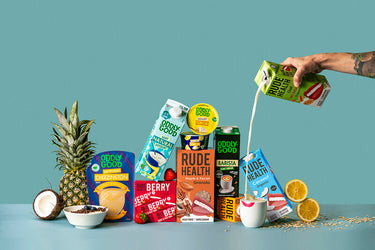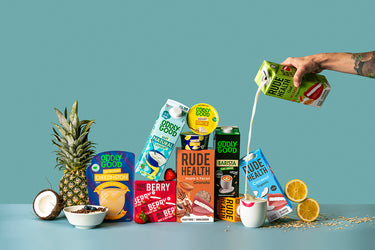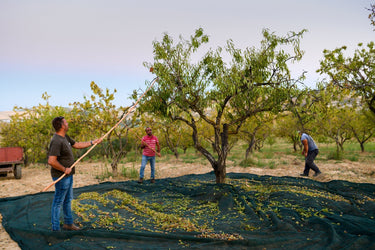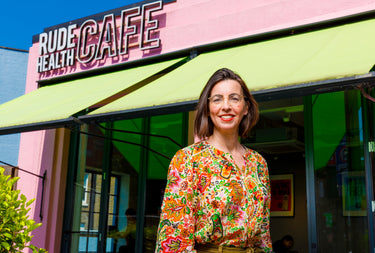Our Packaging
Why is plastic used?
Plastic is a wondrous material. It is malleable, durable, strong, multifunctional. Its use has changed the face of the medical world, modern aviation and most modern technologies, to name a few sectors. As well as helping the food industry. Because of plastic, we have been able to deliver more food to the world’s growing population. Ingredients now have longer shelf-lives and a lower risk of contamination. It has meant, from a Rude Health perspective, that we can deliver greater quantities of Organic (and conventional), lovingly created food to more people.
But we now face a problem.
Plastic is so durable that it is virtually indestructible making it not environmentally or eco friendly. In the food world, where most uses for packaging are singular, this is a problem. Waste has sky-rocketed, and we are running out of places to hide it. Plastic is clogging up our oceans, killing our creatures, and contributing to a rubbish crisis. Luckily, we have options.
Is recyclable plastic bad for the environment?
Technically all plastic is recyclable and all plastic can be destructive to the environment. However, by recycling plastic and reducing the amount that goes to landfill, we are able to reduce the amount of new plastic created. This doesn’t mean that all plastic is recycled. In practice, countries only have the facilities to recycle a few forms of plastic such as PET and HDPE. Other forms are too costly or time-consuming for Government to justify investing in recycling. In theory, a lot of the world’s waste problems might be solved if this were to change. The greater issue, though, is that an alarmingly small amount of the UK’s readily recyclable plastic actually gets recycled. Most of it is exported with other waste, and dumped in a landfill in another country. Furthermore, you can only recycle plastic around 6 times before it becomes unusable, and disintegrates into ever-lasting microplastics. Not great for our oceans.
The bright – and important to celebrate- side is that there are systems in place to recycle, that work, when actually utilised, and that this makes a difference, even if in a small way.
Recycling is a familiar, working solution that can currently offer benefits- even if only temporary, the outcomes are still worthy.
What Is Compostable Packaging?
Compostable materials are made from organic material, and have to decompose within 6 months to be termed ‘compostable’. In theory, they offer a perfect, closed-loop cycle of waste and packaging. The reality, however, is that most compostable packaging is not currently disposed of in the correct manner. Most local councils do not currently support the process, which means that people are throwing compostable packaging in the recycling, or general trash. Compostable packaging cannot be recycled. It will only decompose in exactly the right environment. Simply placing it in your back yard won’t do the trick. Furthermore, compostable packaging offers a significantly lower shelf life for food products. Food waste is currently one of the biggest issues in the world – an alarming fact considering the great issue of world poverty that we face and have faced for decades.
What Is Biodegradable Packaging?
Biodegradable packaging is any form of packaging made from organic materials that will break down at some point in time. This could be anything between 7 months or 60 years. Essentially, humans are biodegradable! The benefit of this material is that they tend to offer slightly longer shelf lives for food, but the down side is that they will too only decompose in very specific conditions.
The Reality:
An important point to consider across all alternative materials is that they are all more expensive than plastic. For many companies, there simply is no budget to make the switch.
So, the cost of us switching to a compostable or biodegradable bag, for our cereals would be a price increase, shorter shelf-life, and therefore greater chance of more food waste. In some cases quality could be compromised to e.g. our granola might lose its crunch sooner and become rancid and soggy.
Given these compromises, we need to be clear that the environmental benefits justify the costs. If compostable packaging is going to end up in recycling then nobody wins.
Consider snack bars, for example, which are often eaten on-the-go in stations etc. There are no compostable waste collection points there. Do most people hang on to all their waste throughout the day and correctly dispose of it later? The reality is that the wrapper would find itself in the general waste, or recycling. Its final days would be spent in a landfill or the ocean, both of which are environments in which it can’t biodegrade or decompose.
We have to be realistic about how most people live their lives, and what solutions would truly benefit our planet.
Our position:
Compostable packaging
From our research and discussions with other sustainable and environmentally conscious brands, we feel that compostable packaging is not the best solution yet. It is a red herring which promises to save the planet, without considering the realities of those who will wind up responsible for the packaging’s final days. We hope this will change, and fast, as compostable packaging is something we really believe will change the face the world for the better. Composting is the ultimate, utopian solution, and we look forward to the day when we can confidently use and promote the system and material.
Recyclable Packaging
Recycling is a familiar, working solution that can currently offer benefits- even if only temporary, the outcomes are still worthy.
If we can make our packaging totally recyclable in the interim, whilst placing pressure on authorities to invest in more recycling plants and proper, functional systems of compostable waste disposal, we feel we are doing the best thing for our planet. We are, too, constantly exploring options, keeping ourselves educated and in conversation with leading brands and leaders in sustainability.
This is not an issue we are approaching lazily, but nor are we doing so hastily, or irresponsibly.












